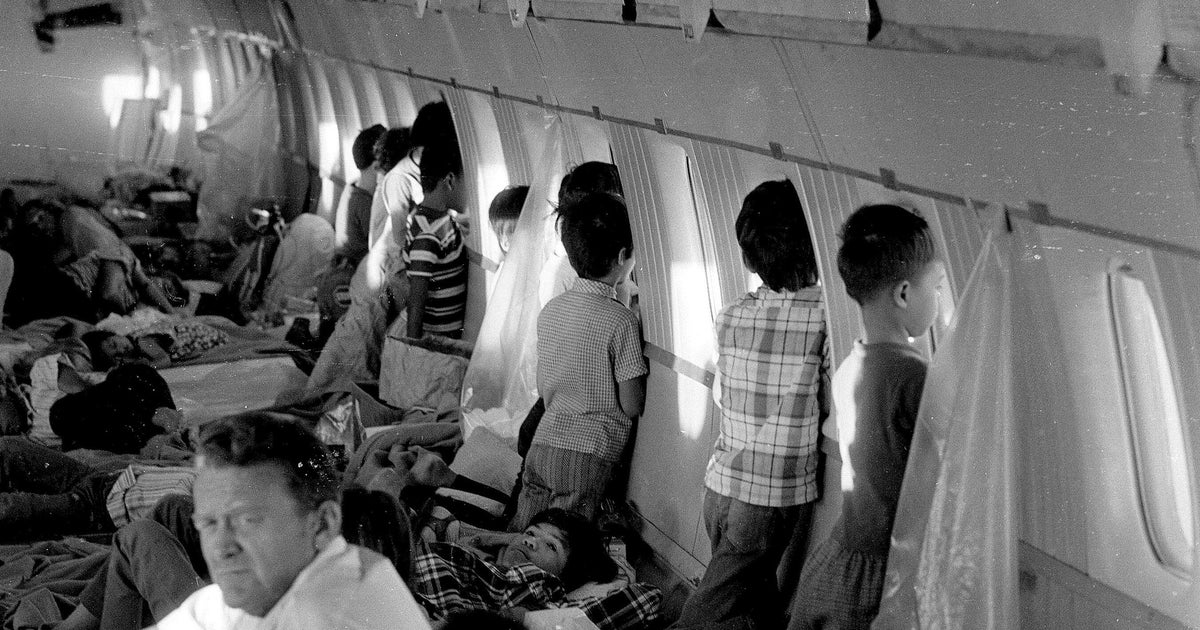In April 1975, during the chaotic final days of the Vietnam War, there were some 3,000 babies in the country that had been fathered by U.S. servicemen.
“Dad felt very responsibly that he wanted to get those babies out,” Steve Ford told CBS News — “dad” in this case being then-President Gerald Ford.
“The word was once the North got into Saigon, that these babies would be possibly slaughtered, killed,” Steve Ford said.
President Ford moved urgently, and Operation Babylift was born, flying more than 2,500 of those children to the United States.
But the first flight in the operation crashed just minutes after takeoff, killing 78 of the nearly 250 children on board. The president was undeterred, and the flights resumed the very next day, filled with cardboard file boxes that had been repurposed into makeshift cradles.
“Dad met the first plane, and one of the best pictures for me is seeing him carrying that first baby off the plane,” Steve Ford said.
Thuy Williams, then just 5 years old, was on that flight.
“There’s actually a picture of me reading a book to the little kid next to me and I just look calm,” she told CBS News.
Williams had originally been placed on the first flight — the one that crashed — but was pulled off at the last moment due to overcrowding. Her mother, who brought her to the plane, believed she had died in the wreckage. It wasn’t until decades later that the two were reunited in Vietnam.
Even beyond the tragedy of the crash, the mission has drawn some criticism over the years. Not all of the children airlifted were orphans. Some had been temporarily placed in orphanages by parents desperate to get them to safety, believing they might be reunited someday. In a small number of cases, children were evacuated without parental or family consent, fueling debate over the ethics of the operation.
“My mom gave me up to save my life,” Williams said when asked about some of the problems with the operation. “A lot of those kids, their parents gave them up to save their lives. Yes, I know that some were taken that weren’t supposed to, that parents expected to get their kids back, but the reality is, what would their life have been like if their parents did get them back, you know? They wouldn’t have had the opportunities that they had here in the U.S.”
Steve Ford acknowledged, “Anytime you have a mission like this, is it gonna be 100%? Absolutely not. That’s- this is war. You’re trying to do the best you can very quickly.”
“I can not imagine what that mother would have to process to make that decision,” he said of women like Williams’ mother, who gave their kids up to get them out of the country.
Williams was adopted by a couple in Portland, Oregon, and said she began to consider herself an American “pretty much probably right away.”
“When your first memories are seeing people killed, those are things you wanna leave behind,” she said.
Ten years after her arrival in the U.S., Williams made the under-18 National Soccer Team. She then spent eight years in the Army, built a construction company and started a nonprofit that takes kids to Africa.
To this day, she coaches soccer, track and lacrosse, and she’s so close to her players that she’s officiated weddings for two of them.
“I understand the opportunities that I had being here in the U.S. I just wanted to serve,” she said.
Steve Ford and Williams recently had a chance to meet at the Gerald Ford Museum.
“My dad would love her story. It would bring tears to his eye to see what she’s done with her life,” Steve Ford said.
“Someone said to me, I’m not sure they’d come get those babies today. I think back on dad. He had the moral clarity to go save those babies. And we had an obligation to do something, to help them,” he added.
